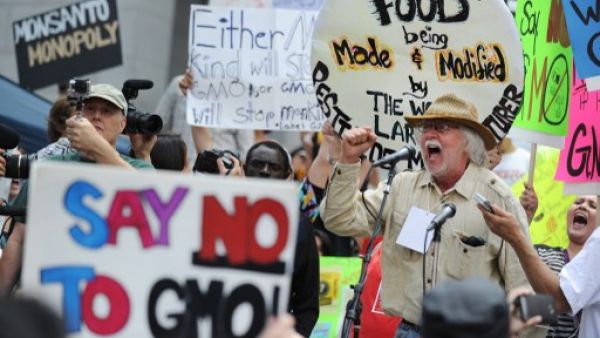Around 100 activists marched to the agriculture ministry in Cairo on Saturday to condemn the introduction of genetically modified food into Egypt.
Protesters carried a puppet dinosaur named after Monsanto, a US multinational biotechnology corporation leading the production of genetically engineered seed worldwide.
"The crops of our country are the solution, Monsanto means humiliation,” and “Monsanto, Monsanto, you killed my crops and took my rights,” protestors chanted.
The event, which was organised by environmentalist group Bozoor Balady (The seeds of my country) and endorsed by left-wing political groups and independent public figures, was part of series of protests in 40 countries.
“Research studies have shown that Monsanto’s genetically modified organisms can lead to serious health conditions, such as the development of cancer, infertility and birth defects,” Bozoor Balady said via Facebook, quoting the 'occupy-monsanto' website.
It also claims genetically modified food (GMF), or biotech food, can be harmful to the environment and that Monsanto is forging a monopoly over the world’s food supply.
Other studies on GMF, however, have strongly disputed such claims.
GMF was quietly introduced to Egypt in 2008. Two thousand acres were cultivated with maize, produced by Monsanto and called 'Agib YG', at a farm along the Cairo-Alexandria road.
Data on the quantities and types of GMF cultivated or sold in Egypt are not publicly available. However, news about a shipment of GM seeds that were due to enter the country in January 2012 caught the attention of activists and prompted parliament to discuss the issue.
The ISAAA (International Service for the Acquisition of Agri-Biotech Applications) mentioned in its report for 2012 that Egypt is one of four African countries cultivating biotech crops.
“We at least have the right to know what we are eating, the government should reveal information about GMF and allow society to discuss it,” says Greenpeace Egypt's Hala Barakat, coordinator of Saturday’s march.
Many countries have a policy that obliges producers and distributors to mention GMF on labels. Shahenda Maklad, founder of a new peasants' union, says the union has found land planted with Monsanto maize in Sadat City on the Cairo-Alexandria road.
In September 2012, a study published in the journal of Food and Chemical Toxicology said, according to Reuters, that rats fed on Monsanto's genetically modified corn or exposed to its top-selling weed killer suffered tumors and multiple organ damage. The animals mainly suffered mammary tumors, as well as severe liver and kidney damage.
Monsanto spokesman Thomas Helscher told Reuters that the company would review the study thoroughly. However, he added: "Numerous peer-reviewed scientific studies performed on biotech crops to date, including more than a hundred feeding studies, have continuously confirmed their safety, as reflected in the respective safety assessments by regulatory authorities around the world."
In 2011, Christopher Preston of the University of Adelaide peer-reviewed 42 studies on the safety of GM products and found very weak evidence supporting claims of its potential health risks.
The war between opponents and advocates of biotech food is ongoing. Monsanto and the ISAAA say biotech food can help fight hunger and alleviate poverty.
By Marwa Hussein








